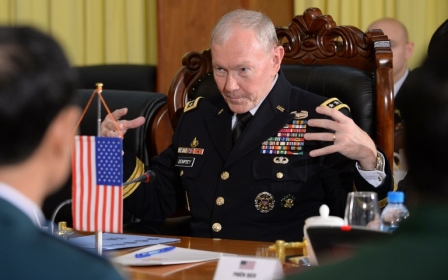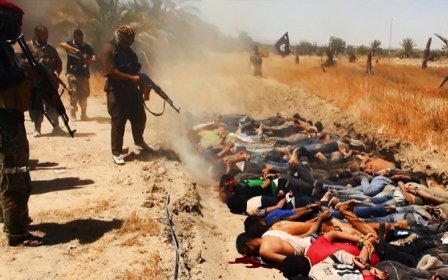Obama's 'limited' foreign policy options in Syria, Iraq

With the revelation that the US carried out a failed special op into Syria to rescue the recently murdered journalist James Foley in 2014, the Obama administration has for the first time confirmed it has been active militarily inside the country.
As the Islamic State threatens to grow and expand over more territory, questions have been raised about the choices made by the US President and the choices he is yet to make, primarily whether the air strikes being carried out against IS in Iraq are a precursor to a wider military operation.
Obama’s foreign policy has been heavily shaped by the legacy of the Iraq War, which has left a sour taste in the mouths of most Americans. Polling has consistently shown the US public opposes military intervention in Syria and the defeat for military intervention in congress (following a similar vote in the British parliament) had seemingly put a stopper on any military action in the country.
Rafaello Pantucci, associate fellow at the International Centre for the Study of Radicalisation, says Obama’s current strategy is reflecting that apprehension.
“I think Obama has made it abundantly clear repeatedly that they are not interested in getting involved in foreign entanglements,” he told Middle East Eye.
“He’s been very careful about doing that so I think they will keep what they are doing on quite a tight leash.”
However, in spite of the reluctance to involve America in direct military action, Pantucci suggests America will feel the need to “do something” in Syria at some point.
“They’re obviously doing something already within that territory,” he said.
The structure of the failed Foley operation could provide a model for future operations and its likely there will be an increasing number of “short sharp targeted interventions.”
Shashank Joshi, a senior research fellow at the Royal United Services Institute, suggested that there could be scope for the US carrying out “leadership assassinations” within the country.
“If you look at the US involvement in Iraq over the last 11 years,” he told MEE, “the use of special forces to kill insurgent and jihadist leaders was a major plank of policy, it was done at a very high rate.”
If a political assassination was to be carried out in Syria and the target was of “sufficiently high value”, it is unlikely there would be much apprehension on the part of Obama in crossing the border.
“If they thought it would be worth the risk, they would go into Syria, particular into the East areas and Northern areas where there’s very limited prospect of resistance from regime forces,” he said.
Obama's actions in Iraq so far have also been tentative - less than 7 air strikes per day have been carried out on IS positions since the start of the conflict and there has been little concrete evidence that he plans to take America any further at this point
“I think Obama thinks there is no point in having a massive campaign over all of Iraq if the political conditions are not ripe to facilitate a settlement and to exploit military gains and if the Iraqi security forces on the ground are incapable of acting to exploit air strikes in a way that the Kurdish forces were," said Joshi.
Talking to Assad
The territory IS controls stretches across borders. The group have pursued an explicitly internationalist agenda, expressing a desire to break the Sykes-Picot borders established in the aftermath of World War 1.
Increasingly, numerous voices closer and closer to the establishment have suggested that in order to coordinate an existential blow against IS, it would be necessary to carry out open strikes within Syria, a move that could ultimately require the US to make overtures to Bashar al-Assad.
Joshi suggests the US could allow the Syrians to act as “a kind of anvil to your hammer” and “catch IS in a pincer movement.”
“Certainly there’s increasing openness to the idea of cooperation with the Assad regime in strategic circles,” he told MEE. “I’m wary of saying that extends into government, but I imagine in pockets of government they are open to talking to the Assad regime.”
“However, I do not think that has percolated up to the upper levels and I’ve seen very little evidence that there has been a shift in policy in that regard where it counts, in the White House.”
He suggested that such a collaboration was unlikely as the “obstacles are still outweighing the benefits.”
Prior to the beginning of the conflict in his country, Assad had previously attempted to improve relations with the West, positioning himself as a pragmatist and moderniser, even coming close to recieving a knighthood from the UK government.
Though the Arab Spring uprisings and his close relationship with Mahmoud Ahmedinejad's Iran led to calls for his overthrow by Western governments, the changing situation in Syria and Iraq and the election of moderate leader Hassan Rouhani in Iran, could be leading the US to once again see a moderate partner in the Syrian President.
Pantucci agreed that avenues seemed to be opening up.
"He certainly seems a lot more palatable than some of the people we’re seeing in Syria fighting against him,” he told MEE. “But at the same time I think there’s a very real danger of stoking the kind of narrative you’re trying to counter by being so callous in turning and supporting the Assad regime in a situation just because suddenly you’re worried about the people fighting him.”
He cited Assad’s facilitation of Islamist fighters travelling into Iraq during the Iraq War as evidence of the risk in allying with Syria.
“I think to some degree there’s even an element of reality to some of these fears that he may have stoked the Sunni insurgency on purpose to produce the kind of reaction we are now seeing,” he said.
“That kind of approach does not strike me as someone who is a trustworthy ally.”
Pantucci also suggested there was some distance to go before establishing a similar coordination with Iran, even though it is also actively involved in organising resistance to IS, whose ideology is implacably hostile to Shia Muslims.
“I was at a meeting with some Iranians recently,” he told MEE.
“I asked this question and the response I got was ‘no, we can’t really talk about grand bargains yet, we’re very focused on trying to resolve the nuclear issue - if that becomes resolved effectively then maybe we can talk about other things being discussed as well.’”
On Friday Iran’s foreign minister Javad Zarif denied an earlier report on Iranian state news that he had offered to help combat IS in return for cooperation on nuclear talks.
An article on the IRNA news agency had originally quoted Zarif as saying "If we agree to do something in Iraq, the other side of the negotiations should do something in return" and that "all the sanctions that are related to Iran's nuclear programme should be lifted."
The Iranian foreign ministry said these quotes were "not correct" and said he had in fact referred to the Arak nuclear facility.
Obama the "realist"
In spite of the protests of neoconservatives and congress Republicans, Obama’s strategy for the Middle East has been praised in some quarters.
Writing in Foreign Policy, Stephen Walt, American professor of international affairs at Harvard University - and not generally known as a fan of the US President - said Obama was an underrated “realist” operator in his handling of the Islamic State.
“Unlike the reflexive threat-inflators who dominate the U.S. foreign-policy establishment, Obama didn't panic over the emergence of this lightly armed group of bloody-minded radicals whose new "caliphate" extends over a lot of mostly empty territory,” he wrote.
“In particular, Obama understood that the threat to the United States itself was neither large nor imminent and that a permanent solution to the problem would require local actors to step up.”
He praised Obama’s success in managing to convince Iraqis to abandon former Prime Minister Nouri el-Maliki describing it as “essentially buck-passing” which is a “time-honored realist tactic”.
“His measured response took advantage of the Islamic State's brutality and overweening ambition, which convinced local actors with far more skin in the game to get serious about dealing with the problem.”
Though the killing of James Foley has prompted a new range of voices calling for a more prominent US presence in Syria, a lack of direct intervention has proved popular in the US and from Obama’s perspective it might be safest to stick to a winning formula.
“I would be surprised if we’re going to see mission creep on the basis of this horrible event,” says Pantucci.
“I think what we’ll see is greater public attention, a concerted, focused effort to do something about this. But I think the Obama administration has done a very good job of steering clear of any foreign entanglement and I don’t see much reason why suddenly this is going to change now.”
New MEE newsletter: Jerusalem Dispatch
Sign up to get the latest insights and analysis on Israel-Palestine, alongside Turkey Unpacked and other MEE newsletters
Middle East Eye delivers independent and unrivalled coverage and analysis of the Middle East, North Africa and beyond. To learn more about republishing this content and the associated fees, please fill out this form. More about MEE can be found here.




